Welcome to the sixth chapter of our new series, From A to I: 9 AI Use Cases to become the Netflix of casinos. Feel free to see the other chapters here.
In this use case, we’ll be diving into how Netflix utilises content recommendations, ensuring that their subscribers are directed to the content that’s most relevant to them. We’ll also explain exactly what casino operators can learn from this and how they can do the same.
Haven’t read the rest of the series yet? Check it out here.
Here are three key learnings about cold start recommendations:
1. Behavioural preferences
It’s tempting to see a popular title in Netflix’s top banner and believe that your homepage is the same as everyone else’s. In truth, every aspect of the experience they offer is built to be as relevant as possible to you.
In our previous blog we spoke about how Netflix approaches cold start recommendations and how they try and retain new players by personalising their experience as quickly as possible. Once that initial period has ended, Netflix must continue to retain their subscribers with continually evolving recommendations.
Based on behavioural preferences Netflix will review a subscriber’s entire experience, looking for opportunities to take behavioural cues and improve recommendations, up-next suggestions, email marketing and much more.
Netflix have shared some of the key factors that go into their recommendations:
1. Subscriber behaviours
2. Behaviours of those with similar preferences
3. Metadata on content
If we dive into the second point, ‘similar preferences’, this technique has been popularised by Amazon and other e-commerce brands as a key driver of growth.
With efficient clustering and similarity systems, Netflix are able to move beyond purely logical sequencing (e.g. recommending more content from the same director) and utilise a full content catalogue, where unique IP might provide equal short-term engagement but provides greater long-term retention.
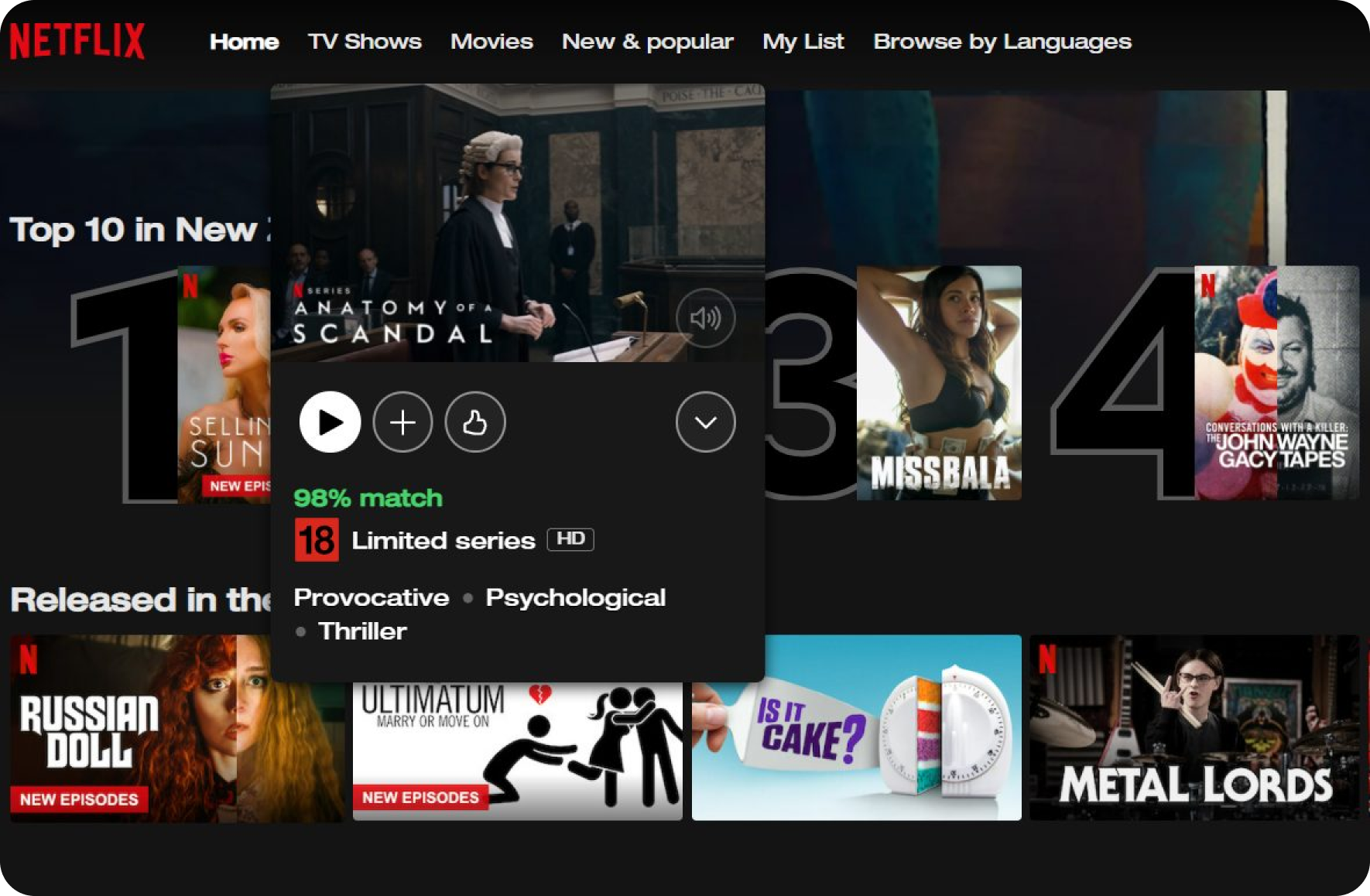
As you would expect, Netflix has enough training data and model improvements to understand what their subscribers like, but that doesn’t mean that they overlook human feedback. Netflix enable subscribers to rate content, and therefore they can provide a match probability for titles, this form of feedback encourages subscribers to continue rating as they see the impact of the time rating.
What casinos can learn
The race to real-time personalisation means that casinos must not wait to offer customised experiences for their users. Listing popular and recently played content is no longer appropriate for a customer with a variety of options for how they spend their time.
Casinos must take advantage of the behavioural data at their disposal, understand how to correctly interpret it, and utilise it across the entire player experience. Future Anthem’s research has shown that the game journeys taken by customers are much wider and diverse than might naturally be expected. As such, it is so important to enable players to have the experiences they would like to.
Part of ‘interpreting’ data means filtering out data that doesn’t add value. Netflix recognises that films that are watched for no more than 5 minutes do not signify interest, quite the opposite. Similarly, casinos must learn the difference between signal and noise. Anthem’s Significant Activity engine enables operators to de-prioritise games from recommendations, avoiding the common cycle of players coming back to games they dislike, only to churn and not return at all.
2. Organisational: metadata
Content organisation is a commonly undervalued asset. Netflix has content deals with various distribution partners around the world, and in receiving such they ensure that relevant metadata is catalogued and sorted accordingly.
Metadata is key for content categories, personalised rows, search, marketing and interestingly also cover images. For those who pay attention to their Netflix recommendations, they’ll notice the covers of a piece of content will change over time, and that is because of a clever use of metadata. By understanding your favourite actors, themes and preferences Netflix will put them on the thumbnail. This uniquely takes the same piece of content and personalises it for individual subscribers.
.png?width=621&height=361&name=Frame%20802%20(2).png)
As you would expect by utilising all of the metadata, there are many different ways to categorise a single piece of content. In addition to the way this can be utilised by machine learning models, Netflix also applies a level of human curation. This leads to the less-well-known, ‘secret codes’, where Netflix has over 30,000 unique forms of genres. They can easily be accessed via URL, and include categories like (90-Minute Movies, aka 81466194) or Gentle British Reality TV (with the code 81240711).
What casinos can learn
Casinos equally face the challenge of collating, curating and displaying from a wide catalogue. What can often be challenging is ensuring that all supplier content is transformed into a unified system. Taking volatility for example, some providers will rank this on a scale of chillies out of 5, some will be out of 10, and some will use another brand-specific scale. While this may look quirky, it makes it harder to correctly compare and make appropriate recommendations.
Casinos must standardise their content meta data and continue to maintain it accordingly. Future Anthem has built a game similarity engine with over 20,000 games’s worth of meta-data, enabling operators to make recommendations while utilising their entire library.
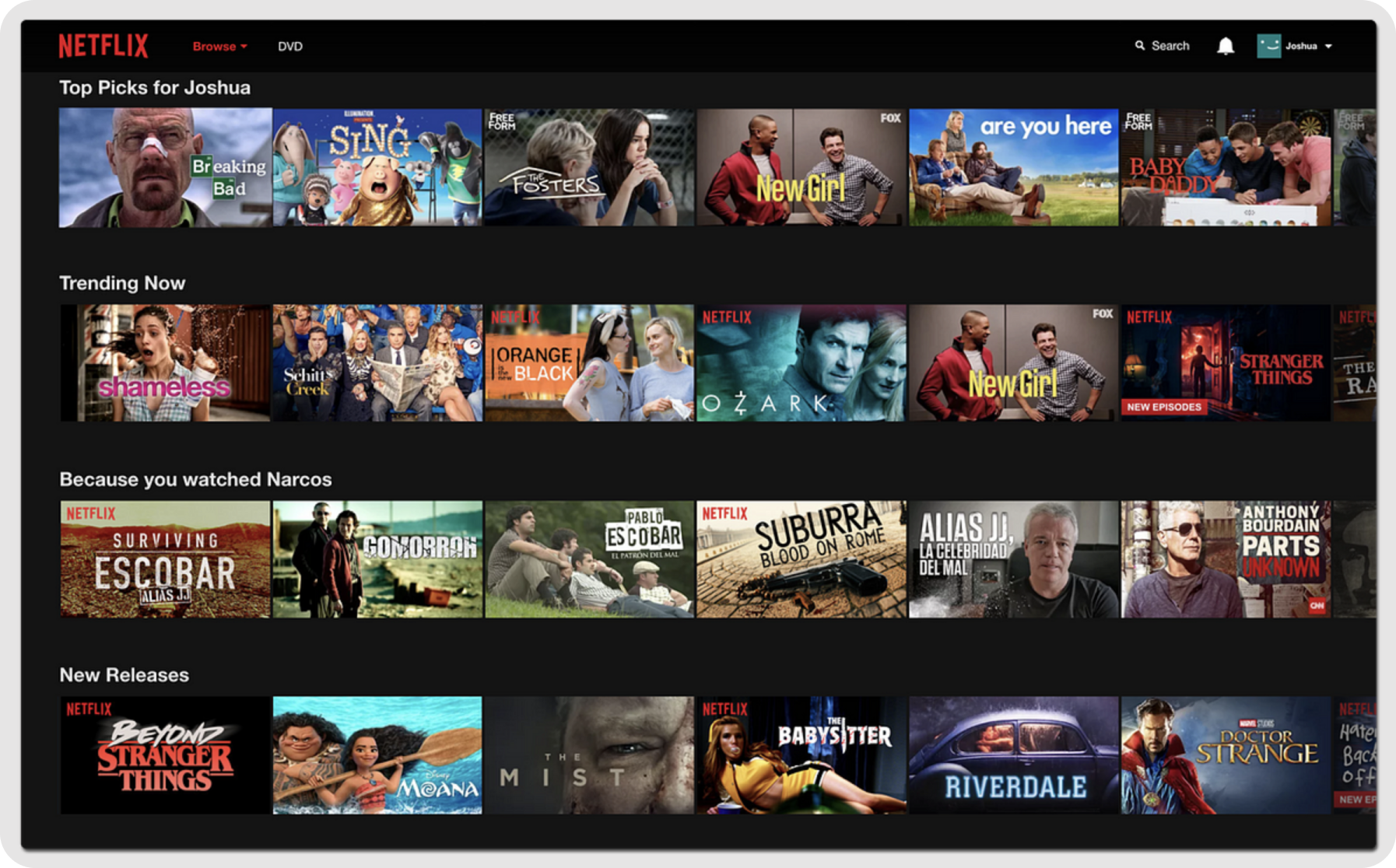
For example, let’s take a row in a lobby labelled ‘because you played x’. In this scenario, it doesn’t just use 10 human-curated options that are presented to all players, but that row can be personalised for every player, both on the game chosen but also the recommendations and their ordering.
3. Every row and every category
Every row, the ordering of the rows, the ordering within the rows, every touchpoint is best considered to retain their subscribers. Now, this isn’t a free-for-all, Netflix almost always maintains the same navigational hierarchy — should you never watch TV shows they will still keep that item in their top options, but overall, they look for moments of navigation.
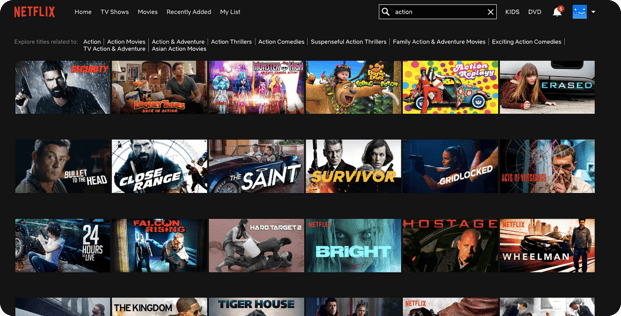
Netflix are known to provide a wonderful mix of human curation and machine learning models with how they approach the recommendation of rows. Like we previously noted about categories, they look for interesting themes to unite, such as shorter films to recommend at night, or those for when you have friends over, but they can still allow the models to order the recommendations within those rows, and how high those rows sit.
And these recommendations also cater for your environment, Netflix offers different recommendations at different times of the day, on different devices, based on the day of the week.
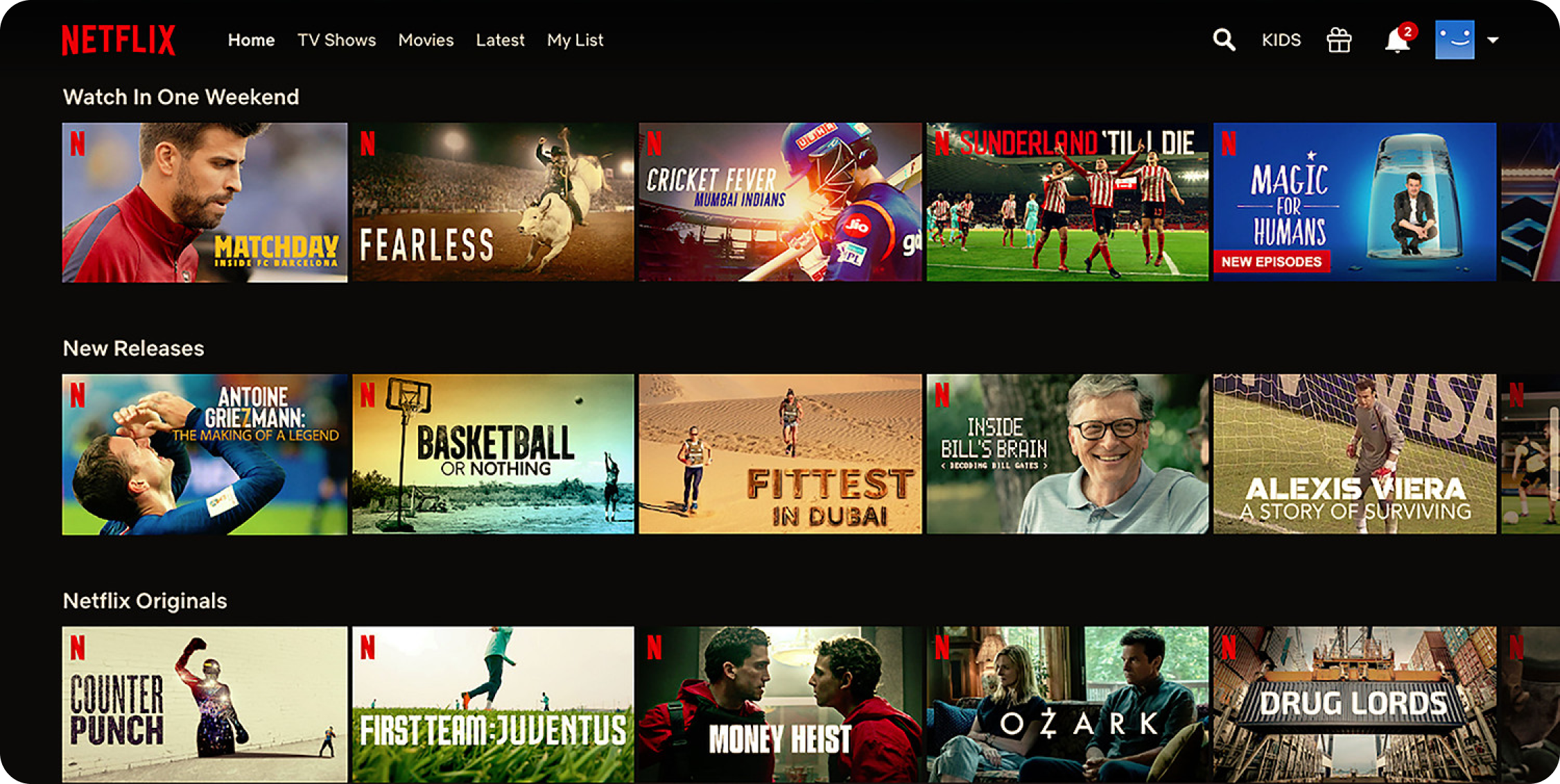 The first row is likely displayed on a Friday or weekend
The first row is likely displayed on a Friday or weekend
What casinos can learn
It’s tempting to see what Netflix does, and where many casinos are at, and find it hard to see the bridge between the two. Technical challenges, roadmap priorities, team buy-in and short-term objectives can make a fully personalised experience not just seem far away, but almost fanciful.
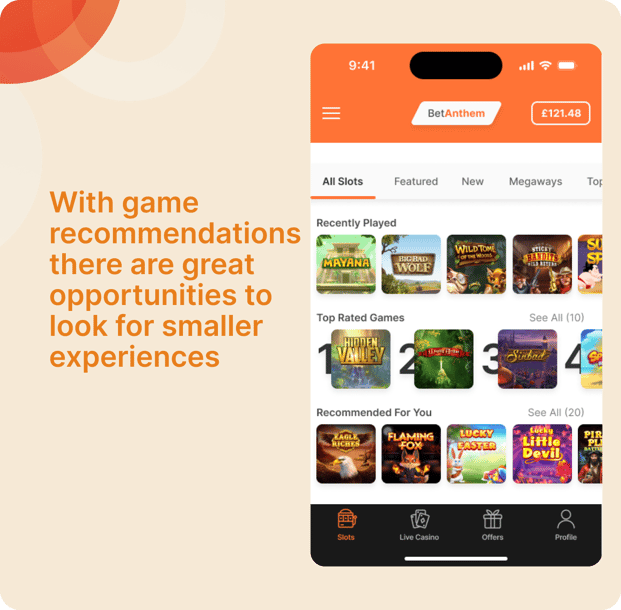
Fortunately, with recommendations, there are great opportunities to look for smaller experiences and build. To A/B test, learn, improve, garner support and continue to proliferate. That could be with a category page, a singular row on a lobby, or just the ordering of existing recommendations.
You may not start 1-to-1. You may start with high-level clusters. There are so many ways to begin the journey to real-time personalisation. Yes, the end case may be an entirely personalised product, where there is no navigation, and it’s just a feed of pure relevancy. But there’s a journey to get there, and whatever stage you’re at, you need a plan to get to where you want to go.
Learn more about Amplifier AI
Have you been following this series closely? Perhaps you’re feeling ready to take the plunge with artificial intelligence? Get in touch with our AI specialists and book a demo today, you’ll soon discover just how you can offer Netflix-level personalisation.
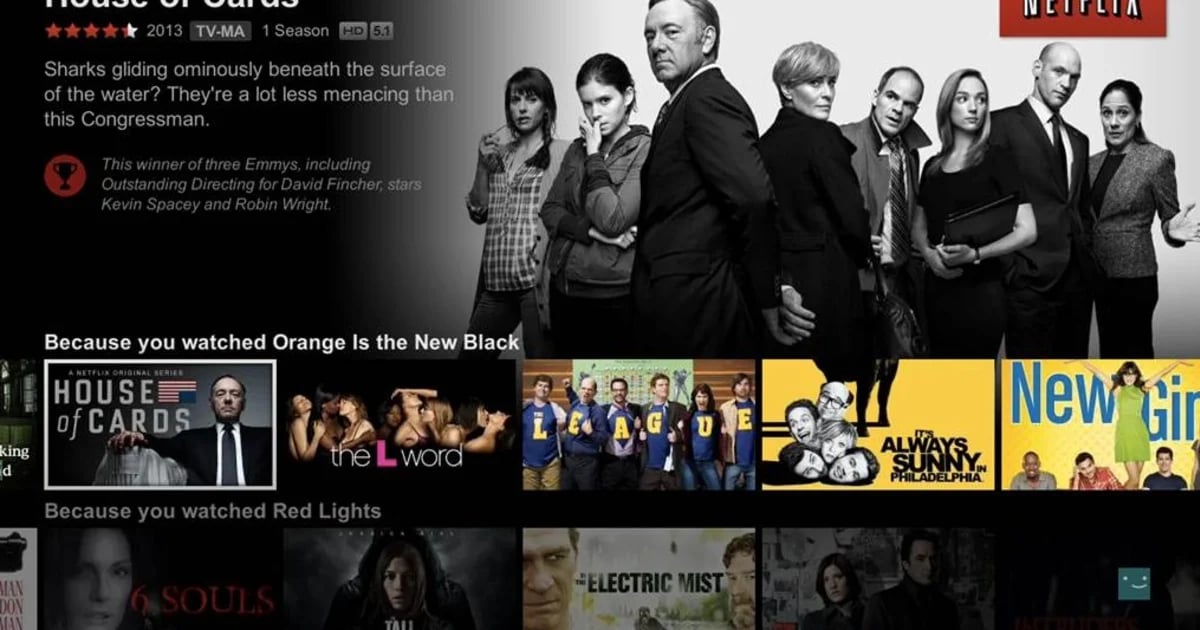
.png?width=2000&height=540&name=Blog%201%20Banner%20(1).png)